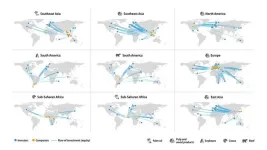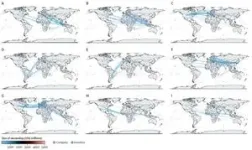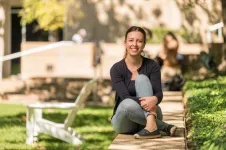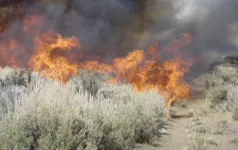(Press-News.org) Many emerging and re-emerging infectious diseases, especially zoonotic diseases such as ebola or new coronaviruses, emerge as the result of intensified human activities such as deforestation, expansion of agricultural land, and increased hunting and trading of wildlife.
In a new study, published in the scientific journal Lancet Planetary Health, researchers identified public and private companies operating in economic sectors associated with increased risks of emerging and re-emerging infectious diseases.
Where data was available, the researchers analyzed the financial entities with equity ownership in 99 identified public companies. They found that a handful of largely US-based financial entities, including Vanguard, State Street, BlackRock, and T Rowe Price, have substantial investments in these companies. But even public investors such as the state of California, Norway through its Sovereign Wealth Fund, and Sweden through its pension funds, hold shares in companies that operate in known regional hotspots for emerging infectious diseases.
“Financial actors have an important, but often ignored, role to help prevent the emergence of infectious diseases. Their investments enable economic activities in known zoonotic disease hotspots globally. Large investors hold potential influence over companies operating in these hotspots, and this influence could be leveraged to mitigate risks of new pandemics,” says Victor Galaz, lead author of the study and senior researcher at the Stockholm Resilience Centre at Stockholm University.
In the article, the researchers list a number of policies and practices which investors could push for, including ecological restoration measures, the creation of pathogen surveillance systems, and improvements in the health and economic security of communities living in geographical hotspots of emerging and re-emerging infectious diseases.
“Corporate policies that focus only on deforestation and land-use change are not enough to mitigate the risk of emerging and re-emerging infectious diseases. They fail to consider how agricultural expansion and deforestation increase the risk of pathogen spillover from reservoir to hosts. There is a need for policies to reduce the edge effect, create pathogen surveillance systems and improve the health care systems of communities living in areas that are emerging infectious hotspots,” explains Paula A. Sánchez, researcher at the Stockholm Resilience Centre and co-author of the study.
The study even identifies countries that either invest themselves or host headquarters of companies with investments in hotspots for emerging infectious diseases. These countries, including France, the USA, Portugal, Norway, and Sweden, could work together to use financial influence to address the risks of outbreaks and pandemics, according to the study’s authors.
“Among many other devastating effects of the COVID-19 pandemic, it has shown what enormous economic costs infectious diseases can have. Investing in sectors that could lead to new outbreaks therefore also carries significant financial risks that investors and governments need to proactively address,” explains Victor Galaz.
He continues: “Such efforts have to go beyond current environmental, social, and governance metrics which have proven to be insufficient to show real-world ecological effects.”
Data availability continues to be a limitation for the identification of potential alliances among investors and corporate actors.
“As emerging and re-emerging infectious diseases present a global risk to the economic and financial systems, there is a need to ensure standardized reporting of corporate and investment activities in infectious hotspots to reduce the risk of outbreaks at a global scale,” says Paula A. Sánchez.
Peter Søgaard Jørgensen, another co-author associated with the Stockholm Resilience Centre comments:
“Climate change will increase the risks of new zoonotic outbreaks. Financial actors should make sure that their investments help to mitigate and adapt to those risks.”
END
Powerful financial giants could play vital role in preventing the next pandemic
Climate change will increase the risks of new zoonotic outbreaks. Financial actors should make sure that their investments help to mitigate and adapt to those risks
2023-12-05
ELSE PRESS RELEASES FROM THIS DATE:
A farsighted approach to tackle nearsightedness #Acoustics23
2023-12-05
SYDNEY, Dec. 5, 2023 – Modern living may be contributing to an epidemic of nearsighted vision and related blindness. By 2050, it is estimated that half the world’s population will suffer from low vision due to myopia, a condition where the eye grows too large and can no longer focus on objects in the distance. Human eyes, honed by evolution to survive in the wild, are ill-adapted to city living, contributing to increased cases of myopia, among other factors.
For decades, researcher Sally McFadden from the University of Newcastle has investigated eyes and eyesight in ...
Services across England now lag far behind East Germany, as experts call for ‘universal basic infrastructure’ in UK
2023-12-05
A new report outlines the dismal state of England’s physical and “social” infrastructure – from public services in health and education to the parks, cinemas and train stations that prop up communities – when compared to similar regions in what was once East Germany.
The report’s authors call for a “universal basic infrastructure” (UBI) if the UK is to ‘level up’ its regions and lift itself out of “flatlining” productivity rates. This UBI would see a minimum ...
Fossil CO2 emissions at record high in 2023
2023-12-05
Global carbon emissions from fossil fuels have risen again in 2023 – reaching record levels, according to new research from the Global Carbon Project science team.
The annual Global Carbon Budget projects fossil carbon dioxide (CO2 emissions of 36.8 billion tonnes in 2023, up 1.1% from 2022.
Fossil CO2 emissions are falling in some regions, including Europe and the USA, but rising overall – and the scientists say global action to cut fossil fuels is not happening fast enough to prevent dangerous climate change.
Emissions from land-use change ...
Interpreting the afterglow of a black hole’s breakfast
2023-12-05
An entirely new way to probe how active black holes behave when they eat has been discovered by an international team of astronomers.
A sample of active black holes at the centre of 136 galaxies were found to shine in microwave and X-ray light in the same way, no matter their appetite for the surrounding galactic matter like gaseous clouds of dust and plasma.
Led by scientists at Cardiff University, the team says the process is not something predicted by our current understanding of how black holes ...
NASA audio specialist named in Forbes 30 Under 30 List of Innovators
2023-12-04
Katie Konans, NASA’s audio and podcasting lead at the agency’s Goddard Space Flight Center in Greenbelt, Maryland, is one of two NASA employees named to Forbes’ 30 Under 30 Class of 2024. The other agency honoree, Clare Luckey, is a systems engineer at NASA’s Johnson Space Center in Houston.
Forbes’ 30 Under 30 list is a selection of young, creative, and bold minds the magazine’s experts consider revolutionaries, changing the course of business and society. Forbes evaluated more than 20,000 nominees to decide on 600 business and industry figures, with 30 selected in each of 20 industries.
“When I joined ...
Supercomputing training at Argonne National Laboratory
2023-12-04
Fatima Bagheri, a National Science Foundation (NSF) postdoctoral fellow at The University of Texas at Arlington, was one of 75 students selected to attend an intensive program on supercomputing at the Argonne National Laboratory in Chicago.
With support from the Department of Energy’s Exascale Computing Program, Bagheri participated in the Argonne Training Program on Extreme-Scale Computer (ATPESC) aimed at teaching attendees the ins and outs of using the latest supercomputers. Bagheri said she came to ATPESC to expand her knowledge of high-performing computers (HPC) like ...
Most adults eligible for statins for prevention are not using them
2023-12-04
Embargoed for release until 5:00 p.m. ET on Monday 4 December 2023
Annals of Internal Medicine Tip Sheet
@Annalsofim
Below please find summaries of new articles that will be published in the next issue of Annals of Internal Medicine. The summaries are not intended to substitute for the full articles as a source of information. This information is under strict embargo and by taking it into possession, media representatives are committing to the terms of the embargo not only on their own behalf, but also on behalf of the organization they represent.
----------------------------
1. ...
EMBARGOED: CAR-T not cost-effective as second-line therapy for diffuse large B-cell lymphoma at current prices, study finds
2023-12-04
EMBARGOED: December 4, 2023, 5PM EST
Contact:
Nicole Oliverio, Dana-Farber Cancer Institute
617-257-0454, nicole_oliverio@dfci.harvard.edu
CAR-T not cost-effective as second-line therapy for diffuse large B-cell lymphoma at current prices, study finds
RESEARCH SUMMARY
Study Title: Peripheral blood TCR clonotype diversity as an age-associated marker of breast cancer progression
Publication: Annals of Internal Medicine, Click here for link
Dana-Farber Cancer Institute authors include: Amar H. Kelkar, MD, MPH (first author); Edward R. Scheffer Cliff, MBBS, MPH; Caron A. Jacobson, MD; Gregory A. Abel, MD, MPH; Corey Cutler, MD, MPH (senior author); and Robert Redd, MS.
Summary: Chimeric ...
Strange burn: new research identifies unique patterns in Utah wildfires
2023-12-04
For a century fire ecologists have worked to decipher a complex question — what does a “normal'' wildfire year look like in the West? That’s a hard question to answer for many reasons, but new research from a team in the Quinney College of Natural Resources shows that thanks to the state’s unique landscapes, Utah’s wildfire patterns may never fit into what is considered “normal” for other Western states.
Utah landscapes are diverse — from dense forests of pinyon-juniper to scattered patches of sagebrush and grasslands, Utah’s variable topography produces ...
New study identifies the greatest threat to wildlife across North America and Canada: people
2023-12-04
You see posts like these on neighborhood Facebook pages all the time: “An owl just flew into my window and appears stunned! Help!” or “I found a baby squirrel on the ground after the wind storm last night. Who do I call?” The answer is a local wildlife rehabilitation center—licensed individuals and organizations that take in hundreds of thousands of sick and injured wild animals nationwide each year. Wildlife rehabilitators see the highest number and greatest range of species of any government or nonprofit organization in the country, giving them unique insight into animal health—and making them great bellwethers of what’s ...
LAST 30 PRESS RELEASES:
DEGU debuts with better AI predictions and explanations
‘Giant superatoms’ unlock a new toolbox for quantum computers
Jeonbuk National University researchers explore metal oxide electrodes as a new frontier in electrochemical microplastic detection
Cannabis: What is the profile of adults at low risk of dependence?
Medical and materials innovations of two women engineers recognized by Sony and Nature
Blood test “clocks” predict when Alzheimer’s symptoms will start
Second pregnancy uniquely alters the female brain
Study shows low-field MRI is feasible for breast screening
Nanodevice produces continuous electricity from evaporation
Call me invasive: New evidence confirms the status of the giant Asian mantis in Europe
Scientists discover a key mechanism regulating how oxytocin is released in the mouse brain
Public and patient involvement in research is a balancing act of power
Scientists discover “bacterial constipation,” a new disease caused by gut-drying bacteria
DGIST identifies “magic blueprint” for converting carbon dioxide into resources through atom-level catalyst design
COVID-19 vaccination during pregnancy may help prevent preeclampsia
Menopausal hormone therapy not linked to increased risk of death
Chronic shortage of family doctors in England, reveals BMJ analysis
Booster jabs reduce the risks of COVID-19 deaths, study finds
Screening increases survival rate for stage IV breast cancer by 60%
ACC announces inaugural fellow for the Thad and Gerry Waites Rural Cardiovascular Research Fellowship
University of Oklahoma researchers develop durable hybrid materials for faster radiation detection
Medicaid disenrollment spikes at age 19, study finds
Turning agricultural waste into advanced materials: Review highlights how torrefaction could power a sustainable carbon future
New study warns emerging pollutants in livestock and aquaculture waste may threaten ecosystems and public health
Integrated rice–aquatic farming systems may hold the key to smarter nitrogen use and lower agricultural emissions
Hope for global banana farming in genetic discovery
Mirror image pheromones help beetles swipe right
Prenatal lead exposure related to worse cognitive function in adults
Research alert: Understanding substance use across the full spectrum of sexual identity
Pekingese, Shih Tzu and Staffordshire Bull Terrier among twelve dog breeds at risk of serious breathing condition
[Press-News.org] Powerful financial giants could play vital role in preventing the next pandemicClimate change will increase the risks of new zoonotic outbreaks. Financial actors should make sure that their investments help to mitigate and adapt to those risks






